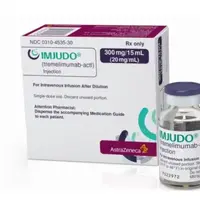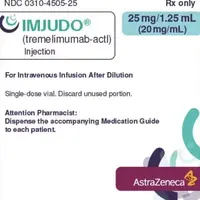Generic name: tremelimumab-actl
Drug class: Anti-CTLA-4 monoclonal antibodies
Dosage form: injection
Availability: Prescription only
Pregnancy & Lactation: Risk data available
Brand names: Tremelimumab (monograph)
What is Imjudo?
Imjudo is a prescription medicine that may be used in combination with Imfinzi (durvalumab) to treat adults with unresectable hepatocellular carcinoma or non-small cell lung cancer (NSCLC) that has spread (metastatic NSCLC).
Imjudo is a human monoclonal antibody that works by blocking the activity of cytotoxic T-lymphocyte-associated protein 4 (CTLA-4).
What is Imjudo used to treat?
Imjudo is used in combination with durvalumab to treat hepatocellular carcinoma, the most common type of primary liver cancer.
- The risk of hepatocellular carcinoma is higher in people who have long-term liver diseases, liver scarring from hepatitis B or hepatitis C infection, those who drink large amounts of alcohol, and those who have an accumulation of fat in the liver.
Imjudo may also be used in combination with durvalumab and platinum-based chemotherapy for the treatment of adult patients with metastatic NSCLC with no sensitizing epidermal growth factor receptor (EGFR) mutation or anaplastic lymphoma kinase (ALK) genomic tumor aberrations.
It is not known if this medicine is safe and effective in children.
Warnings
Imjudo in combination with durvalumab can cause your immune system to attack normal organs and tissues in any area of your body and can affect the way they work. These problems can sometimes become severe or life-threatening and can lead to death. You can have more than one of these problems at the same time. These problems may happen anytime during treatment or even after your treatment has ended.
Call or see your healthcare provider right away if you develop any new or worsening signs or symptoms, including:
Lung problems.
- cough
- shortness of breath
- chest pain
Intestinal problems.
- diarrhea (loose stools) or more frequent bowel movements than usual
- stools that are black, tarry, sticky, or have blood or mucus
- severe stomach-area (abdomen) pain or tenderness
Liver problems.
- yellowing of your skin or the whites of your eyes
- severe nausea or vomiting
- pain on the right side of your stomach-area (abdomen)
- dark urine (tea colored)
- bleeding or bruising more easily than normal
Hormone gland problems.
- headaches that will not go away or unusual headaches
- eye sensitivity to light
- eye problems
- rapid heartbeat
- increase sweating
- extreme tiredness
- weight gain or weight loss
- feeling more hungry or thirsty than usual
- urinating more often than usual
- hair loss
- feeling cold
- constipation
- your voice gets deeper
- dizziness or fainting
- changes in mood or behavior, such as decreased sex drive, irritability, or forgetfulness
Kidney problems.
- decrease in your amount of urine
- blood in your urine
- swelling of your ankles
- loss of appetite
Skin problems.
- rash
- itching
- skin blistering or peeling
- painful sores or ulcers in mouth or nose, throat, or genital area
- fever or flu-like symptoms
- swollen lymph nodes
Pancreas problems.
- Pain in your upper stomach-area (abdomen)
- severe nausea or vomiting
- loss of appetite
Problems can also happen in other organs and tissues. These are not all of the signs and symptoms of immune system problems that can happen with Imjudo. Call or see your healthcare provider right away for any new or worsening signs or symptoms, which may include:
- chest pain, irregular heartbeats, shortness of breath or swelling of ankles
- confusion, sleepiness, memory problems, changes in mood or behavior, stiff neck, balance problems, tingling or numbness of the arms or legs
- double vision, blurry vision, sensitivity to light, eye pain, changes in eye sight
- persistent or severe muscle pain or weakness, muscle cramps
- low red blood cells, bruising
Infusion reactions that can sometimes be severe or life-threatening. Signs and symptoms of infusion reactions may include:
- chills or shaking
- itching or rash
- flushing
- shortness of breath or wheezing
- dizziness
- feel like passing out
- fever
- back or neck pain
Getting medical treatment right away may help keep these problems from becoming more serious.
Your healthcare provider will check you for these problems during your treatment. Your healthcare provider may treat you with corticosteroid or hormone replacement medicines. Your healthcare provider may also need to delay or completely stop treatment if you have severe side effects.
How should I take Imjudo
- Your healthcare provider will give you Imjudo into your vein through an intravenous (IV) line over 60 minutes. Then durvalumab is also given through an intravenous (IV) line over 60 minutes.
- Imjudo is given to you as a single dose.
- Your healthcare provider will test your blood to check you for certain side effects.
- If you miss your appointment, call your healthcare provider as soon as possible to reschedule your appointment.
Dosing information
Usual Adult Dose for Unresectable Hepatocellular Carcinoma
Weight 30 kg and more:
Imjudo 300 mg as a single dose in combination with durvalumab 1,500 mg at Cycle 1/Day 1, followed by durvalumab as a single agent every 4 weeks
Weight less than 30 kg:
Imjudo 4 mg/kg as a single dose in combination with durvalumab 20 mg/kg at Cycle 1/Day 1, followed by durvalumab as a single agent every 4 weeks
Comment:
- Administer Imjudo as an intravenous infusion over 60 minutes after dilution.
Use:
- indicated in combination with durvalumab, for the treatment of adult patients with unresectable hepatocellular carcinoma
Usual Adult Dose for Metastatic NSCLC
Greater than or equal to 30 kg: 75 mg every 3 weeks in combination with durvalumab 1,500 mg and platinum-based chemotherapy for 4 cycles, and then administer durvalumab 1,500 mg every 4 weeks as a single agent with histology-based pemetrexed therapy every 4 weeks, and a fifth dose of Imjudo 75 mg in combination with durvalumab dose 6 at week 16.
30 kg or less: 1 mg/kg every 3 weeks in combination with durvalumab 20 mg/kg and platinum-based chemotherapy for 4 cycles, and then administer durvalumab 20 mg/kg every 4 weeks as a single agent with histology-based pemetrexed therapy every 4 weeks, and a fifth dose of Imjudo 1 mg/kg in combination with durvalumab dose 6 at week 16.
Use:
- the treatment of adult patients with metastatic NSCLC with no sensitizing epidermal growth factor receptor (EGFR) mutations or anaplastic lymphoma kinase (ALK) genomic tumor aberrations in combination with durvalumab and platinum-based chemotherapy.
Before Taking
Before you receive Imjudo, tell your healthcare provider about all of your medical conditions, including if you:
- have immune system problems such as Crohn's disease, ulcerative colitis, or lupus
- have a condition that affects your nervous system, such as myasthenia gravis or Guillain-Barré syndrome
- are pregnant or plan to become pregnant. Imjudo can harm your unborn baby.
- are breastfeeding or plan to breastfeed. It is not known if this medicine passes into your breast milk. Do not breastfeed during treatment and for 3 months after your last dose.
Females who are able to become pregnant
-
- Your healthcare provider should do a pregnancy test before you start treatment.
- You should use an effective method of birth control during your treatment and for 3 months after your last dose. Talk to your healthcare provider about birth control methods that you can use during this time.
Tell your healthcare provider right away if you become pregnant or think you may be pregnant during treatment.
Imjudo side effects
Imjudo can cause serious side effects, including:
See Important information
The most common side effects of Imjudo when used in combination with durvalumab include:
- rash
- diarrhea
- feeling tired
- itchiness
- muscle or bone pain
- stomach (abdominal) pain
Tell your healthcare provider if you have any side effect that bothers you or that does not go away.
These are not all the possible side effects. Ask your healthcare provider or pharmacist for more information.
Call your doctor for medical advice about side effects. You may report side effects to FDA at 1-800-FDA-1088.
See more: Imjudo Side EffectsWhat other drugs will affect Imjudo?
Tell your healthcare provider about all the medicines you take, including prescription and over-the-counter medicines, vitamins, and herbal supplements.
How will I receive Imjudo?
- Your healthcare provider will give you Imjudo into your vein through an intravenous (IV) line over 60 minutes. Then durvalumab is also given through an intravenous (IV) line over 60 minutes.
- Imjudo is given to you as a single dose.
- Your healthcare provider will test your blood to check you for certain side effects.
- If you miss your appointment, call your healthcare provider as soon as possible to reschedule your appointment.
Dosing information
Usual Adult Dose for Unresectable Hepatocellular Carcinoma
Weight 30 kg and more:
Imjudo 300 mg as a single dose in combination with durvalumab 1,500 mg at Cycle 1/Day 1, followed by durvalumab as a single agent every 4 weeks
Weight less than 30 kg:
Imjudo 4 mg/kg as a single dose in combination with durvalumab 20 mg/kg at Cycle 1/Day 1, followed by durvalumab as a single agent every 4 weeks
Comment:
- Administer Imjudo as an intravenous infusion over 60 minutes after dilution.
Use:
- indicated in combination with durvalumab, for the treatment of adult patients with unresectable hepatocellular carcinoma
Usual Adult Dose for Metastatic NSCLC
Greater than or equal to 30 kg: 75 mg every 3 weeks in combination with durvalumab 1,500 mg and platinum-based chemotherapy for 4 cycles, and then administer durvalumab 1,500 mg every 4 weeks as a single agent with histology-based pemetrexed therapy every 4 weeks, and a fifth dose of Imjudo 75 mg in combination with durvalumab dose 6 at week 16.
30 kg or less: 1 mg/kg every 3 weeks in combination with durvalumab 20 mg/kg and platinum-based chemotherapy for 4 cycles, and then administer durvalumab 20 mg/kg every 4 weeks as a single agent with histology-based pemetrexed therapy every 4 weeks, and a fifth dose of Imjudo 1 mg/kg in combination with durvalumab dose 6 at week 16.
Use:
- the treatment of adult patients with metastatic NSCLC with no sensitizing epidermal growth factor receptor (EGFR) mutations or anaplastic lymphoma kinase (ALK) genomic tumor aberrations in combination with durvalumab and platinum-based chemotherapy.





